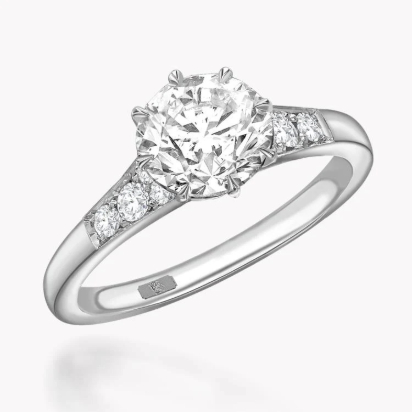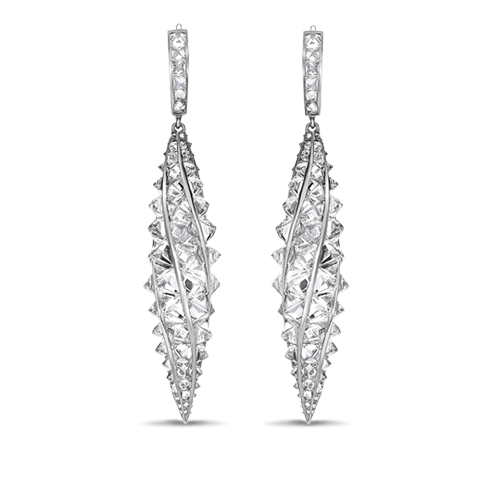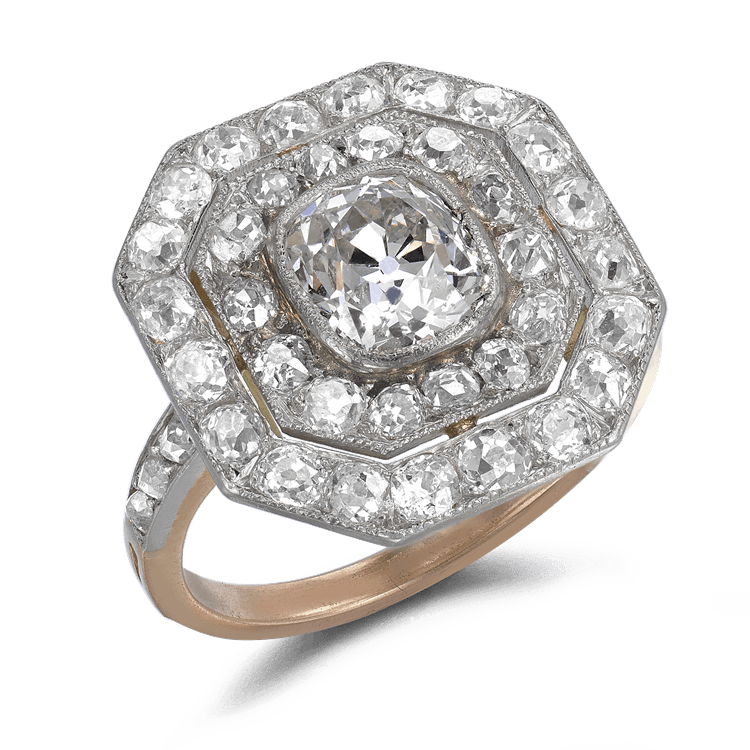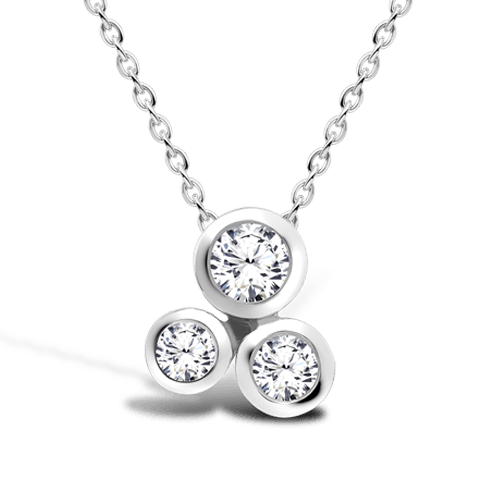The Diamond Cut Guide
The cut of a diamond is often considered the most crucial factor in determining its brilliance and fire. It’s the most important factor out of the 4Cs (cut, colour, clarity and carat).
In this guide, we'll dive into the fascinating world of diamond proportions, facets, and symmetry, exploring how they interact with light to create mesmerising displays of sparkle.
If you're new to the diamond world or an experienced aficionado aiming to enhance your knowledge, this guide is designed to help you make well-informed choices about the ideal diamond cut. Dive into the realm of classic round brilliants and discover the artistry behind intricate fancy shapes.
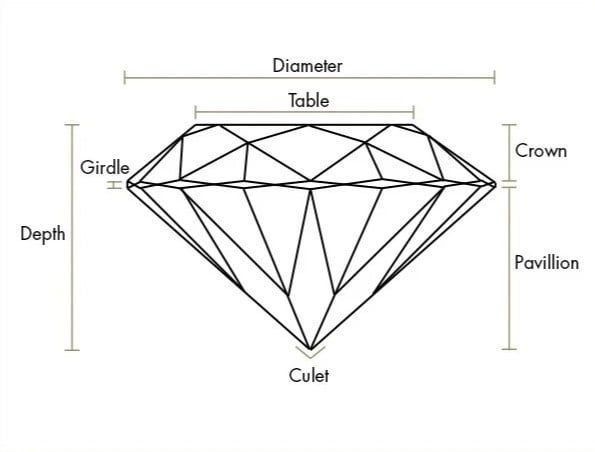
Anatomy of a Diamond
Before we give you a definition of a diamond cut, it’s essential to understand the anatomy of a diamond. The anatomy of a diamond includes several key components:
Table: The flat, topmost facet of the diamond.
Crown: The upper portion above the girdle, comprising facets that play a role in light reflection.
Girdle: The outer edge, separating the crown from the pavilion.
Pavilion: The lower portion below the girdle, featuring facets that contribute to light refraction.
Culet: The small facet at the bottom of the diamond's pavilion.
Facets: The flat, polished surfaces that make up the diamond's crown, pavilion, and table.
Depth: The distance from the table to the culet, contributes to the diamond's proportions.
Diameter: The width of the diamond when measured across the girdle.
Symmetry: The precision of the diamond's facets and their alignment.
Polish: The quality of the diamond's surface finish.
The interplay of these components impacts a diamond's brilliance, sparkle, and overall appearance.
.jpg)
What is Diamond Cut?
Diamond cut refers to the way a diamond's facets are proportioned, shaped, and aligned. It's a crucial factor that influences the diamond's ability to reflect and refract light, resulting in its brilliance and sparkle. A well-cut diamond interacts with light optimally, displaying vibrant flashes of colour and light patterns.
Cut quality is graded by experts, affecting a diamond's visual appeal and value. It's important to strike a balance between cut, colour, clarity, and carat weight when selecting a diamond to ensure it radiates its full beauty.
Why Is Diamond Cut Important?
A well-cut diamond reflects light internally and then returns it through the top of the stone, making it look livelier and more brilliant. Diamonds that are cut too deep or too shallow lose light, reducing their sparkle and decreasing their value.
The GIA (Gemological Institute of America) also assesses a diamond’s symmetry and balance and how well it has been polished. The resulting cut grade ranges from ‘Excellent’ to ‘Poor’.
Brilliance, fire, and scintillation collectively contribute to the captivating beauty and allure of a diamond. A well-cut diamond will balance these three aspects, creating a stunning visual display of brightness, colourful flashes, and dynamic sparkle as it interacts with light from various angles.
Brilliance: Brilliance refers to the intense brightness or white light that a diamond emits when light enters the stone and is reflected back to the viewer's eye. This effect is a result of the diamond's exceptional ability to refract (bend) and reflect light.
The brilliance of a diamond depends on its cut, which determines how well the facets of the diamond interact with light. A well-cut diamond will exhibit high brilliance, with light bouncing off its facets in a way that creates a dazzling sparkle.
Fire: Fire, also known as dispersion, is the phenomenon where a diamond separates white light into its spectral colours (like a rainbow). This happens due to the diamond's ability to break down the light into its individual colour components as it passes through the stone and is refracted.
Fire is particularly noticeable when the diamond is exposed to direct light sources, and it adds a mesmerising play of colours to the diamond's appearance. The angles and quality of the facets play a role in how much fire a diamond exhibits.
Scintillation: Scintillation refers to the flashes of light and sparkle that a diamond displays when it moves or is viewed from different angles. It's the dynamic play of light and dark areas that occur as the diamond is rotated or light sources change. Scintillation is a result of the intricate arrangement of facets on the diamond's surface. When the diamond is moved, the facets catch and reflect light in a captivating way, creating the characteristic "bling" that many people associate with diamonds.
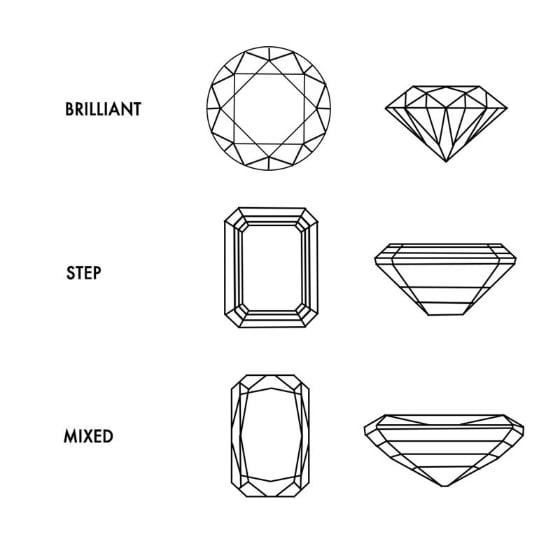
Types of Diamond Cut
The three primary diamond cut styles are:
Brilliant Cut
Featuring triangular and kite-shaped facets, it maximises brilliance and sparkle. Examples include the round brilliant and princess cuts. A brilliant-cut diamond typically has 57 or 58 facets.
Step Cut
The step cut, with rectangular or square facets in parallel lines, emphasises clarity and creates a "hall of mirrors" effect. Examples include emerald and Asscher cuts. Step-cut diamonds usually have 44 to 48 facets.
Mixed Cut
Combining elements of brilliant and step cuts, it balances brilliance and clarity. Examples include radiant and cushion cuts. Mixed-cut diamonds can have anywhere from 58 to 70 facets or even more.
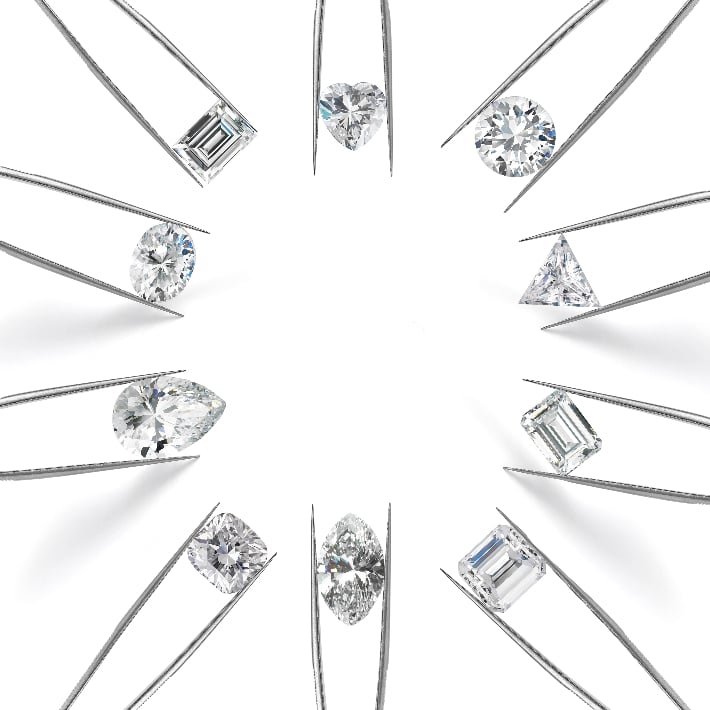
The Different Diamond Shapes
There are various diamond shapes, each with its unique characteristics. Some popular diamond shapes include:
Round Brilliant: Classic and timeless, known for its exceptional brilliance.
Princess: Square or rectangular shape with pointed corners, offering a modern look.
Emerald: Rectangular with cut corners and step-cut facets, emphasising clarity.
Cushion: Square or rectangular with rounded corners and larger facets, blending vintage and modern.
Oval: Elongated shape with rounded edges, offering elegance and brilliance.
Marquise: Elongated with pointed ends, creating an illusion of larger size.
Pear: Teardrop shape merging round and marquise cuts, versatile and unique.
Heart: Romantic shape symbolising love, featuring a distinctive heart outline.
Radiant: Square or rectangular with cut corners, balancing brilliance and trimmed corners.
Asscher: Square with step-cut facets, producing a hall of mirrors effect.
Trillion: Triangular shape, often used as side stones to complement other gems.
Baguette: Rectangular with step-cut facets, typically used as accent stones.
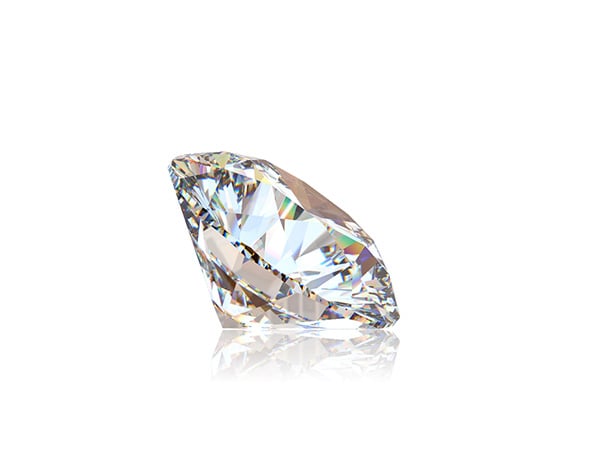
What is Triple Excellent Cut?
A "triple excellent" cut refers to a round brilliant diamond that has received the highest grades in all three crucial aspects of its cut: excellent for cut, excellent for polish, and excellent for symmetry.
This designation, often seen in diamond grading reports from organisations like GIA, indicates a diamond with exceptional light performance and overall quality.
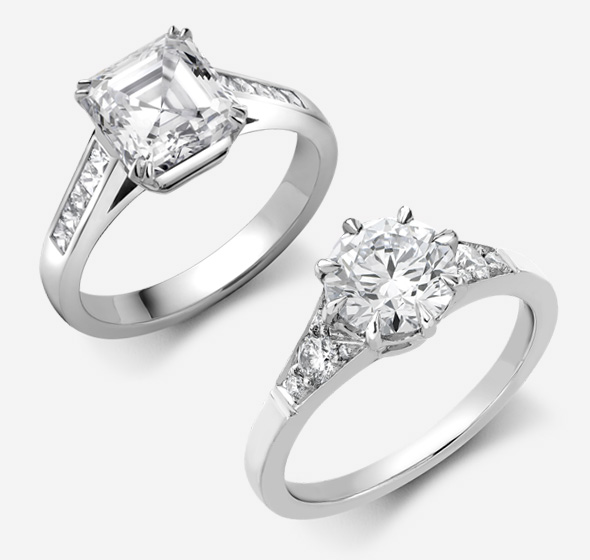
The Factors that Determine a Diamond’s Cut Quality
Several factors determine a diamond's cut quality:
Proportions: The relationships between the diamond's dimensions influence how light interacts within the stone.
Symmetry: The precision of the diamond's facets and their alignment affect its brilliance.
Polish: The quality of the diamond's surface finish impacts its light reflection.
Girdle Thickness: A balanced girdle thickness ensures proper light dispersion.
Culet Size: A small culet prevents light leakage from the bottom.
Facet Alignment: Precise facet alignment maximises light return.
These factors collectively determine a diamond's ability to reflect and refract light, affecting its brilliance and sparkle.
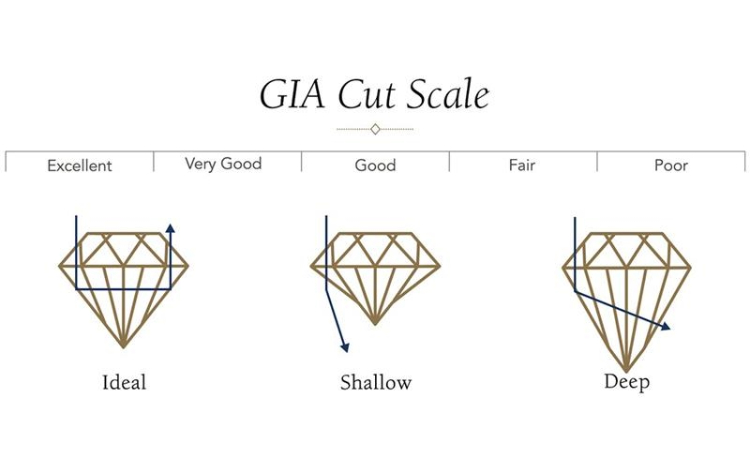
The Diamond Cut Chart
The diamond cut chart is a visual representation of a diamond's proportions and their impact on its light performance. It illustrates how a diamond's cut influences its brilliance, fire, and overall visual appeal.
The chart typically depicts the relationships between factors like table percentage, crown angle, pavilion angle, and more. It helps buyers understand how different combinations of these proportions affect the diamond's ability to reflect and refract light optimally.
A well-proportioned diamond will fall within certain ranges on the chart, ensuring it has the potential to exhibit maximum sparkle and beauty.
Avoid Diamonds Wearing a Bow Tie
A diamond bow tie effect occurs when light is not reflected properly due to the diamond’s cut. It consists of a darkened area that runs across the width of the diamond’s body and resembles a bow tie – hence the name. In essence, the bow tie is a shadow inside the diamond. This occurs when some of the facets in the middle of the diamond are poorly cut; these facets do not reflect light properly, regardless of the direction in which you turn or tilt the diamond.
A bow tie is one of the more easily noticeable defects a diamond can have, and you don’t need to be an expert to identify a diamond wearing a bow tie. When purchasing a diamond shape that could be prone to bow ties, such as Oval, Pear, or Marquise, always make sure that you inspect the stone carefully in various lights and at different angles.
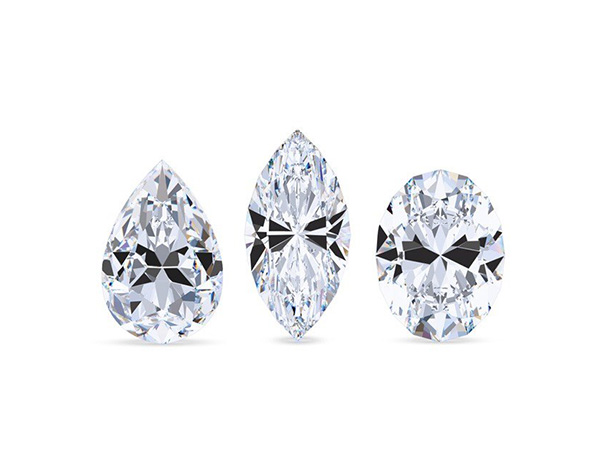
Diamond Cut Standards at Pragnell
At Pragnell, we believe cut is the most important C, as it gives the diamond life. We look at how the cut has been executed to ensure it has been done to a high standard, and we only use diamonds whose cut is graded ‘Very Good’ or above.
Frequently Asked Questions
Below are the answers to our most commonly asked questions. Should you want to find out more please feel free to contact us and begin your Pragnell experience.
View By Category
Explore a selection of pieces from across the Pragnell range
Jewellery CLP Page
Contact us
